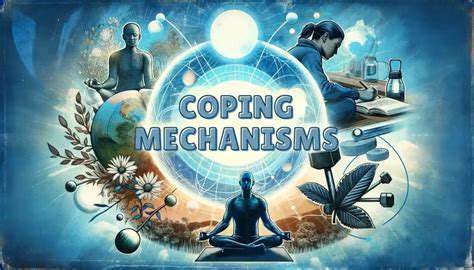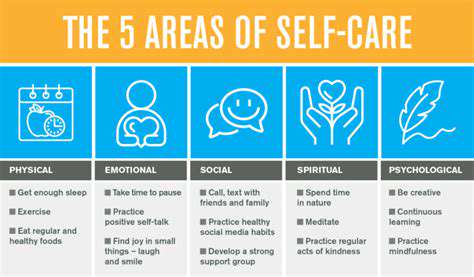Building a Personalized Crisis Plan for Mental Health
Identifying Your Triggers and Early Warning Signs
Understanding Your Personal Triggers
Identifying your personal triggers is a crucial first step in building a personalized crisis plan. Triggers are specific situations, emotions, or thoughts that consistently lead to heightened stress or anxiety. They can be internal, such as negative self-talk or past traumas, or external, such as certain social situations or environmental factors. Recognizing these triggers allows you to proactively anticipate potential distress and develop coping mechanisms to manage them effectively. Understanding your triggers is not about avoiding them entirely, but about becoming more aware of their influence and developing strategies to navigate them.
Taking time for self-reflection and journaling can be incredibly helpful in identifying your triggers. Pay attention to patterns in your emotional responses. When do you feel overwhelmed? What thoughts or feelings tend to precede these moments? By diligently documenting these experiences, you can begin to see recurring themes and identify the specific situations, people, or internal thoughts that act as your triggers.
Recognizing Early Warning Signs
Early warning signs are the subtle cues that your body and mind give you before a crisis escalates. These signs can vary greatly from person to person, but they often involve physical sensations, emotional changes, or behavioral shifts. Understanding these early warning signs is vital for intervening before a crisis fully develops. Being able to recognize these signs allows you to take proactive steps, such as engaging in calming activities or seeking support, before things spiral out of control.
For example, a racing heart rate, difficulty concentrating, feeling irritable, or withdrawing from social interaction might be early warning signs. These signs can serve as your personal alarm bells, indicating that you need to take a step back and implement strategies to manage the escalating stress. Tracking these signs in a journal can be incredibly helpful in recognizing patterns and developing a better understanding of your own unique responses.
Developing Coping Mechanisms
Once you've identified your triggers and early warning signs, you can begin to develop coping mechanisms to manage them effectively. Coping mechanisms are strategies you can use to effectively manage stress, anxiety, or other challenging emotions. These can range from simple techniques like deep breathing exercises to more involved strategies like seeking professional help. The key is to find what works best for you and to have a variety of options available to draw upon in different situations.
Developing a toolbox of coping mechanisms is a crucial part of building a personalized crisis plan. This may include relaxation techniques like meditation or progressive muscle relaxation, engaging in physical activity, spending time in nature, or connecting with supportive individuals. Experiment with different approaches to discover what helps you regain a sense of calm and control during challenging times. It's also important to remember that coping mechanisms aren't a one-size-fits-all solution; what works for one person might not work for another.
Creating a Support System
Building a strong support system is essential for navigating crises effectively. Having trusted individuals who can offer emotional support, practical assistance, or just a listening ear can significantly impact your ability to manage difficult situations. These individuals can be family members, friends, mentors, or even mental health professionals. A robust support network provides a safety net during times of emotional distress and offers valuable perspectives and guidance.
Identifying people you can rely on, whether for practical help or emotional support, is an integral part of crisis planning. These individuals may be able to offer practical assistance, such as helping with childcare or errands, or they may simply provide a comforting presence. A strong support network can provide much-needed validation, encouragement, and a sense of belonging when you're struggling. It's important to communicate your needs and preferences to those in your support system to ensure they understand how best to support you.
Developing Coping Mechanisms and Support Systems

Developing Healthy Coping Mechanisms
Developing effective coping mechanisms is crucial for managing stress, anxiety, and other challenges in life. These mechanisms provide a toolbox of strategies to navigate difficult situations and promote emotional well-being. By learning and practicing various coping techniques, individuals can build resilience and improve their overall quality of life. Coping mechanisms can range from simple relaxation exercises to more complex therapeutic approaches, tailored to individual needs and preferences.
A key element in developing healthy coping mechanisms is recognizing the triggers and patterns associated with stress and negative emotions. Understanding these triggers allows for proactive strategies to manage the situation and prevent escalating feelings of overwhelm.
Identifying and Addressing Underlying Issues
Sometimes, the root cause of emotional distress lies in underlying issues like trauma, unresolved conflict, or past experiences. Addressing these underlying issues is an essential aspect of developing sustainable coping mechanisms. Professional help, such as therapy or counseling, can provide guidance and support in exploring and resolving these issues. This approach is often more effective than focusing solely on surface-level coping strategies.
Practicing Mindfulness and Relaxation Techniques
Mindfulness and relaxation techniques, such as deep breathing exercises, meditation, and progressive muscle relaxation, are powerful tools for managing stress and anxiety. These techniques help to cultivate a sense of calm and awareness, allowing individuals to respond to challenges more effectively rather than reacting impulsively. Regular practice can significantly reduce stress hormones and promote a sense of inner peace.
Mindfulness involves paying attention to the present moment without judgment. Practicing this can help individuals become more aware of their thoughts and feelings without getting carried away by them. This awareness is key to managing stress and anxiety.
Seeking Support and Building a Strong Support System
Building a strong support system is vital for coping with challenges. Talking to trusted friends, family members, or support groups can provide emotional validation, practical advice, and a sense of belonging. Strong social connections can buffer the negative impact of stress and provide a sense of security and hope. Don't hesitate to reach out to others when you need support.
Seeking professional help when needed is equally important. Therapists, counselors, and other mental health professionals offer guidance, support, and strategies tailored to individual needs. They can help individuals develop coping mechanisms and navigate difficult emotions.
Implementing Lifestyle Changes for Enhanced Well-being
Implementing positive lifestyle changes can significantly contribute to overall well-being and the development of effective coping mechanisms. Prioritizing sufficient sleep, maintaining a balanced diet, and engaging in regular physical activity are fundamental pillars of healthy living. These healthy habits can directly impact mood regulation and stress management. Regular exercise releases endorphins, which have mood-boosting effects.
Furthermore, setting realistic goals, prioritizing tasks, and learning time management techniques can reduce feelings of overwhelm and promote a sense of accomplishment. These practices contribute to a more balanced and manageable lifestyle, making it easier to cope with challenges.

Read more about Building a Personalized Crisis Plan for Mental Health
Hot Recommendations
- AI Driven Personalized Sleep Training for Chronic Insomnia
- AI Driven Personalization for Sustainable Stress Management
- Your Personalized Guide to Overcoming Limiting Beliefs
- Understanding Gender Dysphoria and Mental Health Support
- The Power of Advocacy: Mental Health Initiatives Reshaping Society
- Building a Personalized Self Compassion Practice for Self Worth
- The Ethics of AI in Mental Wellness: What You Need to Know
- AI Driven Insights into Your Unique Stress Triggers for Personalized Management
- Beyond Awareness: Actionable Mental Health Initiatives for Lasting Impact
- Creating a Personalized Sleep Hygiene Plan for Shift Workers
